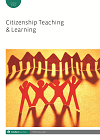- Home
- A-Z Publications
- Citizenship Teaching & Learning
- Previous Issues
- Volume 11, Issue 1, 2015
Citizenship Teaching & Learning - Volume 11, Issue 1, 2015
Volume 11, Issue 1, 2015
-
-
Swedish students’ conceptual knowledge about civics and citizenship: An interview study
More LessAbstractThe background for this study is a model for civics knowledge and teaching that distinguishes conceptual knowledge, ability to identify social and political issues, and civic literacy. The study itself investigates challenges in civics teaching by focusing on students’ difficulties understanding the subject matter. In a think aloud interview, some of the most difficult questions from the IEA International Civic and Citizenship Education Study were presented to 29 eighth-grade students in a municipality fairly representative of average Swedish conditions. There were shortcomings in their conceptual knowledge and also in their understanding of social and democratic principles, highlighting the importance of reading skills for civic ability. The article suggests strategic work with conceptual learning and for civic teaching to include an explicit focus on reading comprehension. It suggests that the ability to reflect on complex civic issues is benefited by asking questions and discussing social and political principles from different perspectives.
-
-
-
Understanding civic cognitive assessment tasks: Associations between linguistic features and students’ task performance
More LessAuthors: Ting Zhang, Judith Torney-Purta and Robert J. MislevyAbstractThis study investigates how text features and item characteristics are associated with early adolescents’ performance in large-scale assessments in civic education (CIVED). Examining responses to multiple-choice items from the IEA CIVED assessment, the study identified linguistic features related to item difficulty. These features account for more than one-third of the variance in difficulty level of 38 test items for a national sample of 3000 US ninth-grade students. On this test in CIVED short words, words with concrete meanings, intentional verbs and certain noun phrases were likely to facilitate students’ comprehension and ability to correctly answer an item. Contrariwise, lengthy words, words with abstract meanings and complex syntactic structure hindered student performance. Some linguistic features significantly predict the performance of students from homes with high literacy resources, but do not reach significance for less advantaged students. Kintsch’s situation model helps to interpret these results.
-
-
-
The effects of reading well-written passages on students’ civic understanding and engagement
More LessAuthors: Marilyn J. Chambliss, Judith Torney-Purta and Wendy Klandl RichardsonAbstractStudents report learning about civics from reading textbooks more than from any other instructional activity. The US textbooks are often poorly organized, unfamiliar and uninteresting, creating a comprehension challenge for adolescents who struggle to learn the content these books contain. This study explored whether adolescents could understand civics content from reading a passage prepared to be comprehensible, present challenging content contrasting direct with representative democracy and enhance their interest. We prepared three passages to inform, argue or explain, which are genres used by political scientists. A total of 168 15-year-olds read one of the three passages and answered items to measure their comprehension, understanding about democracy, motivation to take action and interest in both the passage and social studies. These adolescents tended to comprehend all three passages, understand the complex content about democracy and express motivation to take action. We consider whether these results could be extended to countries other than the United States.
-
-
-
Decision Making and Citizen Participation in Korean and US textbooks: Passage features, cultural differences and comprehension
More LessAuthors: Hyejin Huh and Marilyn J. ChamblissAbstractThis study focused on 10-year-olds reading explanations from Korean and US textbooks to discover how well the children could comprehend the materials and what educators from the two countries could learn from one another. Passages from both countries reflected writing patterns in their larger cultures, but the Korean passages had more culture-free features that would enhance comprehension than the US passages. A total of 63 Korean and 57 US 10-year-olds read one of the passages from their own country or a translation from the other country and responded to items to assess knowledge, comprehension, and interest. Possessing background knowledge was positively associated with comprehension regardless of topic or country. Overall, both the US and Korean children comprehended the Korean explanations more effectively than the US passages. Both culture-independent and culture-dependent passage features seem to have contributed to this difference, suggesting approaches to improving instructional materials in civics for students across cultures.
-
-
-
Learning from text in an advanced government and politics course
More LessAuthors: Sheila W. Valencia and Walter C. ParkerAbstractWe report a study of the literacy challenges faced by students and teachers in an advanced, project-based version of the US Government and Politics course. The study occurred in the current era of school reform when students of all abilities, not just well-prepared students, are encouraged to take advanced classes. As a result, classrooms contain individuals with a wide range of reading abilities and domain knowledge. Students in this study, when working with course texts, encountered densely constructed textbooks, challenging specialized vocabulary, and lack of teacher support for learning from text. Generally, they could read but not comprehend. Both teachers and students developed strategies to avoid learning from textbased resources. These strategies hindered students’ ability to learn course content and further disadvantaged students who needed more practice and support in learning from text. We end with two recommendations for supporting all students to effectively learn from civic-related texts.
-
Most Read This Month


